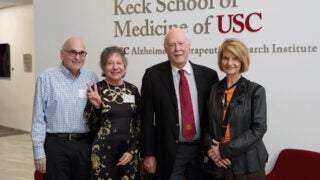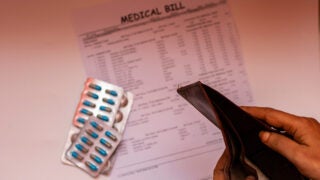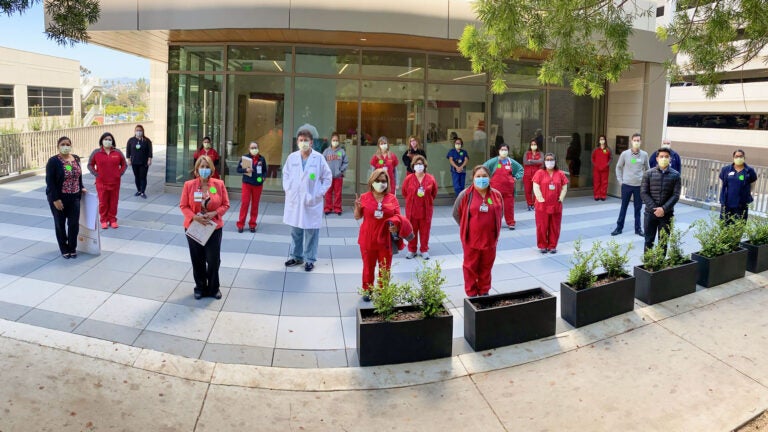
Meet the dedicated crew that keeps our Keck Medicine professionals safe
As patients with COVID-19 receive treatment at local hospitals, health experts work behind the scenes to look after those on the front lines: USC’s physicians, nurses and other medical workers.
For those responsible for employee health at Keck Medicine of USC, everything changed on Friday the 13th.
On that date in March, they first tested a Keck Medicine worker for a suspected case of COVID-19.
“That’s when everything exploded,” said Earl Strum, medical director of employee health and clinical professor of anesthesiology. “We didn’t have much time to experiment after that.”
On Monday, March 16, a lab test confirmed suspicions: The hospital worker had the coronavirus. Keck Medicine’s employee health team set its plans in motion. Several white tents where workers could be tested quickly rose in a parking lot on the USC Health Sciences Campus. Nurses and lab technicians swaddled themselves in protective gowns, gloves and masks. They cautiously tested dozens of health care workers who had contact with the employee who tested positive.
The next day, the testing rate skyrocketed. Nearly 200 medical professionals drove through the site and lowered their car windows to have their throats and noses swabbed. Like their colleagues a day earlier, they drove off to quarantine until their results came back days later, letting them know whether they could safely return to work.
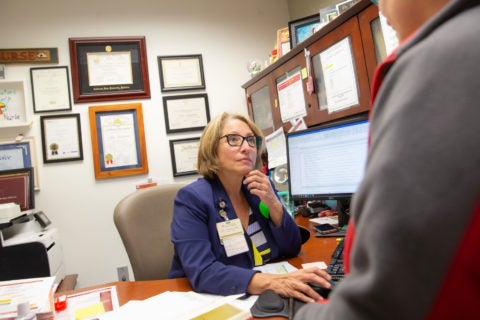
“We knew something was coming, but we didn’t think it would come so quickly and so hard,” said Yolee Casagrande, nurse director at Keck Medicine. “When it came, it was a tsunami for us.”
Even outside of times of crisis, Keck Medicine boasts a team of staff members whose job is to ensure the health and well-being of nurses, doctors, therapists and other care providers. They provide support and guidance when hospital or clinic workers get sick or injured. COVID-19 sent them into overdrive.
For weeks, they had been planning for the moment when the coronavirus pandemic reached the doors of Keck Medicine’s health system and began threatening the well-being of crucial care providers. Their diligence is paying off with quick testing and rigorous prevention efforts that will be critical to limiting the spread of the virus among hospital and clinic employees.
“It’s been a scary, scary time,” Casagrande said. “But it’s also been a beautiful thing to witness in terms of collaboration and humanity and caring.”
Slowing spread of coronavirus requires safeguarding USC health workers
The employee health team screens workers to find coronavirus-positive staff members before they contact others, protecting employees and patients alike.
“We don’t want our employees getting sick for their own sake, and also, we need our employee population healthy to take care of our sick patients,” Strum said.
“We also have families. We don’t want to take this back to our families. This way, we also provide peace of mind for our health care workers.”
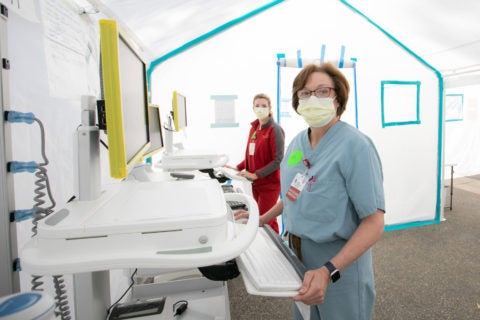
At screening tents in a USC parking lot, nurses ask Keck Medicine staff members standard questions: Have they been exposed to someone with COVID-19? Do they have flu-like symptoms like fever, chills and fatigue? Anyone who says yes gets a swab test and must stay in isolation until results are complete. Through USC’s new Care for the Caregivers program, they have the option to wait out their quarantine period in USC housing at no cost to them.
Behind the scenes, other nurses operate a 24-hour hotline for employees who have questions about their well-being or how to be tested. Data analysts trace the potential path of the virus, helping hospital administrators determine if others might have been exposed and need to be screened. Lab technicians at Children’s Hospital Los Angeles test samples and report results.
Volunteers from many disciplines have joined members of Keck Medicine’s employee health division on the screening team, Casagrande said.
“People are stepping up to the plate,” she said. “It makes me very proud of my profession, being a nurse, and I’m very proud of our nursing staff and everyone else on our team.”
A screening nurse describes efforts to keep USC health care workers safe
Jon Morales was the first volunteer to step forward. He is a registered nurse in Keck Medicine’s float pool — a group of nurses who go to where they’re needed most on any given day.
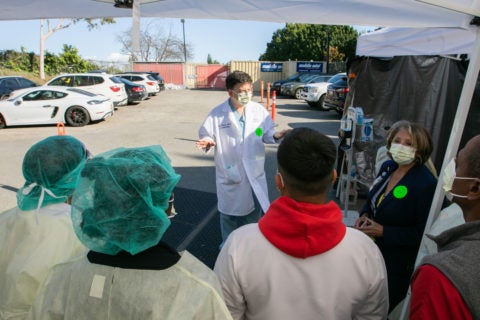
“We tend to be on the front lines of a lot of things, the more difficult situations,” he said. “It’s par for the course for this job.”
On his first day of screening, Morales watched Casagrande demonstrate how to test for COVID-19 exposure, using what health professionals call a nasopharyngeal swab, resembling a long cotton swab. Then he got to work, administering the tests as carefully as possible to avoid exposure.
He described his process: “It first goes in the back of the throat and tickles back near the tonsils on both sides. Then that same swab comes out and then inside one of the nostrils. It goes deep back, so it can be quite uncomfortable for most people.”
Despite safety risks, health care providers feel duty to serve their patients
Morales, 40, knows he risks his health every day doing this job. He often thinks about a college classmate who also became a nurse.
“He was swabbing someone just like we are, and he contracted COVID-19,” Morales said. “I saw photos of him in the ICU with a tube up his nose and on a ventilator. That was a wakeup call for me. Whoa, that could be me.”
But Morales feels called to action. Scenes from his wife’s home country of Spain, other areas of Europe, New York City and elsewhere comfort and encourage him. Every evening, people there come to their windows to applaud health care workers.
“Everyone is out banging pots and pans and cheering all the medical professionals who are risking their lives,” he said. “I saw my wife was proud of me that I’m doing this. Normally she’d have bad anxiety over such a thing, but she is really proud and gave me approval.”
Thankfully, his college acquaintance has shown signs of improvement, and Morales is hopeful he’ll make a full recovery.
His fellow nurse’s experience with COVID-19 won’t keep Morales from doing his job. “People need to be out there on the front lines, helping patients,” he said.
“We’re nurses. This is what we signed up for.”
Keck Medicine employee health experts plan for rising COVID-19 cases
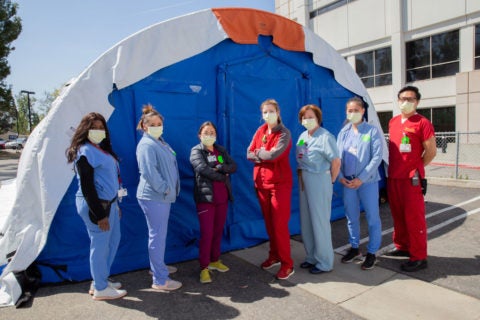
After the initial rush to contain any spread of the virus within Keck Medicine’s employee ranks, the testing work has slowed down, Strum said. Now the team screens 30 to 60 health workers a day.
And after their run of 18-hour workdays, Strum and Casagrande are also getting a bit of a reprieve.
“It’s gotten better,” Strum said. “It’s gone down to 14 hours some days. But even when we go home, we’re still talking with our patients, with each other, answering phone calls.”
They aren’t letting their guard down, though. They’ve been monitoring news reports and warnings from public officials that California might still be at the initial edge of a wave of new COVID-19 cases.
The employee health team wants access to more rapid testing, possibly up to 400 tests a day, should they need to screen more health workers in the coming weeks.
“Right now, we’re making our plans to stay ahead of this curve,” Strum said. “We don’t want to play catch up. We want to be forward-thinking and go to where the puck is, not where it was.”
On front lines and with safety uncertain, health care workers stand strong
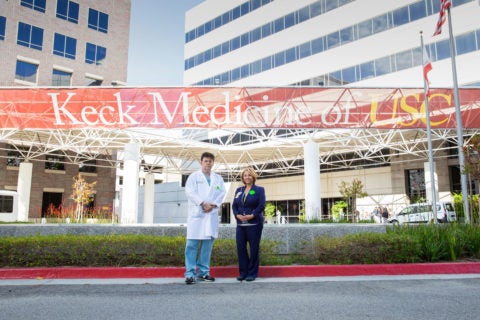
Casagrande and Strum acknowledged that many front-line health care providers are concerned for their safety. That includes the nurses and lab techs on the employee health team. But like Morales, many of those caregivers feel a duty to their profession, they said.
“People are scared, but you can’t let that enter into the equation when you’re treating patients,” Strum said. “You have to put everything aside and focus on treating your patient or your fellow health care worker. You can’t have any other thoughts in your head. You can only think about success.”
Casagrande echoed those comments and described the pride she feels for the nurses and other health workers who continue to put on protective gear and treat patients despite the risk to their well-being.
“I’ve heard beautiful stories from nurses who have been in quarantine for only a few days and already want to come back,” she said. “They want to help out. They want to be part of taking care of our patients and each other.”

